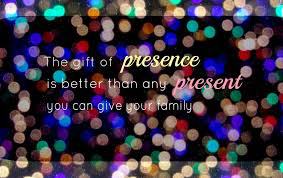I’m looking forward to the festive season this year. It holds an opportunity: a time to get together with friends, family and generally unplug from an ordinarily busy life. However, I haven’t always felt this positive anticipation about the winter break, so I can understand the statistics that uncover another somewhat ‘darker’ side to December (and indeed one that continues in to the early part of the New Year). Recent data released by the Centre for Mental Health shows peak rates of stress, anxiety and depression at this time of year – and this is above the ordinary baseline of 23% of adults who suffer from mental health issues. Staggering and worrying figures.
How has a season that was once about joy become one that brings on such stress, anxiety and depression? Why has a time of opportunity to connect become a period threatening loneliness and isolation?
 From my experience – personal, and through my work as a therapist and mindfulness meditation teacher – I see a common theme of people losing sight of their personal values and taking on board externally imposed ideals. Every TV commercial break, high street advertising poster, social media posting implies that this is the season of good cheer – so busy are we swallowing these societal messages and expectations of ‘the perfect Christmas’ (the Hallmark Cards version!) that we get confused. It is like we are on a runaway train, the speed of which speeds up and up – stand back and watch any High Street in the UK on a Saturday afternoon in December and that speed is evident. Are we chasing our tails in the hope of a perfect Christmas story?
From my experience – personal, and through my work as a therapist and mindfulness meditation teacher – I see a common theme of people losing sight of their personal values and taking on board externally imposed ideals. Every TV commercial break, high street advertising poster, social media posting implies that this is the season of good cheer – so busy are we swallowing these societal messages and expectations of ‘the perfect Christmas’ (the Hallmark Cards version!) that we get confused. It is like we are on a runaway train, the speed of which speeds up and up – stand back and watch any High Street in the UK on a Saturday afternoon in December and that speed is evident. Are we chasing our tails in the hope of a perfect Christmas story?
A lot of this speed is justified by ‘tradition’ – doing things because “we’ve always done them this way”. Families find themselves on a rotation – “last year we were with your family, so this year we are at mine”. The compromise? Large amounts of driving on motorways as we split our family time across Christmas and Boxing Day. The internal dialogue goes “why all this charging around…this is meant to be a holiday”. Don’t get me wrong’ tradition is lovely – it has the capacity to bond us and create wonderful memories. However, there is a potential to bind rather than bond.
Have you ever taken a step back and considered that you have a choice? I wonder how many people across the UK don’t actually like turkey?! I say that a little tongue in cheek, but hopefully it illustrates the point. Rules and rota can enslave us.
Tradition and the high ideals set us up for a fall. As soon as expectations enter stage left, it will soon be joined by disappointment stage right. I can remember many times when I have been excited about the festivities to come, catching up with friends, being reunited with family – and then sitting in the moment (with those same friends, same family that had been in my fantasies) and feeling utterly dissatisfied, and in fact, downright sad…lonely. I had images of the perfect gathering – and those anticipations of what could be are rarely met.
How can we expect to spontaneously connect with people that we haven’t seen for the 11 months of the year?
 Relating to others is one of most challenging aspects of the holiday season. We long for connection and instead we spend a lot of the time holding irritation. The pressure of the build up and expectation makes most people tetchy – as if we’ve wound ourselves up so much that we are a time-bomb ready to explode (or implode once back on the sofa back home…if we’ve been able to hold it in during the visit itself!) Christmas gatherings mean we often find ourselves in big groups: this magnifies the issue, as we have less opportunity for one-to-one connection (speaking personally, this is the type of engagement that I find most nourishing). Conversations can feel empty and meaningless, especially if the TV is on in the background or there is a table full of food – it can feel hard competing with the all the distractions. And then enters our old friend, the Inner Critic – “Why is my family like this? I bet everyone else is having a wonderful time”.
Relating to others is one of most challenging aspects of the holiday season. We long for connection and instead we spend a lot of the time holding irritation. The pressure of the build up and expectation makes most people tetchy – as if we’ve wound ourselves up so much that we are a time-bomb ready to explode (or implode once back on the sofa back home…if we’ve been able to hold it in during the visit itself!) Christmas gatherings mean we often find ourselves in big groups: this magnifies the issue, as we have less opportunity for one-to-one connection (speaking personally, this is the type of engagement that I find most nourishing). Conversations can feel empty and meaningless, especially if the TV is on in the background or there is a table full of food – it can feel hard competing with the all the distractions. And then enters our old friend, the Inner Critic – “Why is my family like this? I bet everyone else is having a wonderful time”.
It is no wonder that we can find ourselves turning to unhelpful habits e.g. drinking, eating, disconnecting through social media. Feelings of isolation and loneliness are common at this time of year: ironically they can peak when in a room full of people. We look to things outside of ourselves as ways to ‘get through’, to fill the emptiness. And to make it worse, our Inner Critic is watching – we eat more than we ‘should’, drink more than we ‘should’…and we can berate ourselves LONG in to the New Year!
How do we manage this?
As a blogging enthusiast (reader as well as writer), I am well aware of the popularity of lists yet I find myself resisting to offer you “10 ways to survive the holiday madness”. Maybe because it can feel like another set of rules over the (already) demanding holiday time (reminder…HOLIDAY not self-improvement boot camp!). The kindest thing we can do – for ourselves and others – is to simplify things…
Coming back to basics: setting an intention
In all the Hallmark Cards / Picture Perfect expectations, we end up operating on automatic pilot – like the shoppers on the High Street rushing around. Expectations lead to speed; speed cancels out awareness; and we need awareness to track how our actions are in line with our intention. We end up creating distance from our true wishes for contentment and connection to others. How can we stay in touch with our values?
Stop reading this post and take a moment to consider this: what is your intention for these coming weeks? What would you like to see / feel / come away with from the winter break?
Meeting the balance of our own needs and those of others is always tricky, no matter the time of year. But without adequate time for oneself, batteries become discharged and we notice we are in a state of reactivity. Taking time-out, slowing down and operating from a place of intention on the other-hand means we can meet each situation (each family get together!) with ‘our best self’…you know that person, the one who is present enough to respond rather than react?
Are there ‘landing pads’ in the coming weeks when you can rest, ground and nourish your own wishes?
For meditators, this is a good time to UP your practice…its so easy when we are busy to not make time for our practice – yet this is probably the time we need it the most, to ground and centre, to be able to go inward and read our needs. If we don’t see our own needs, how can we express them skillfully to others?
 Communication of needs is often a big oversight at this time of year. It is very hard to make and / or keep everyone happy. In expressing our own needs we feel we may disappoint others, and we can drop in to a place of guilt or feeling ‘selfish’. NOTE – expressing your own needs is NOT selfish. I am reminded that we cannot serve others from an empty vessel. Yes, sensitivity is needed (if we are in a reactive state we might end up demanding rather than asking). But I would argue that we need to be honest and open – we cannot truly be with people if we are there with resentment. There may be times that people will find it hard to hear, but we cannot be responsible for other people’s reactivity. See if there is room for negotiation – it is better to give yourself fully for a 2 hour visit than begrudgingly stay a whole day.
Communication of needs is often a big oversight at this time of year. It is very hard to make and / or keep everyone happy. In expressing our own needs we feel we may disappoint others, and we can drop in to a place of guilt or feeling ‘selfish’. NOTE – expressing your own needs is NOT selfish. I am reminded that we cannot serve others from an empty vessel. Yes, sensitivity is needed (if we are in a reactive state we might end up demanding rather than asking). But I would argue that we need to be honest and open – we cannot truly be with people if we are there with resentment. There may be times that people will find it hard to hear, but we cannot be responsible for other people’s reactivity. See if there is room for negotiation – it is better to give yourself fully for a 2 hour visit than begrudgingly stay a whole day.
Removing (or at least reducing) resentment means we are more present. It allows us to become more mindful in each unfolding moment. We can have space as a reaction arises – whether that be as an emotion like anger builds, or watching a moment of emptiness when we don’t feel heard or met. No area is this more helpful than with our consumption of food and drink. If we can bring mindfulness to the moment before reaching for another glass of wine, refill of the buffet plate we can begin to ask questions like “am I still hungry? Do I need another drink? Is there an emotional hunger am I looking to fulfill?
Awareness of our inner world also allows us to keep an eye on our Inner Critic. When we notice that voice we can soften a little and move towards giving ourself permission. There IS more food and drink around at this time of year (and it tends to be tastier too!). And even though we are not working such long hours, social and family commitments = less routine and therefore time to exercise may be limited. As a consequence, we may enter January a few pounds to the ‘bad’. On one hand, be mindful of consumption; on the other-hand know that any ‘slips’ are not the end of the world. Better to get in touch with your reasons for eating and drinking than watching yourself like a hawk and not being able to enjoy yourself.
 It is not just about permission either, there is something about honouring our feelings too. Be aware of how you feel, and give those feelings an airing – if you are struggling, give yourself permission to be stuggling rather than telling yourself “I shouldn’t be feeling this way, I should be grateful”. The Buddhist teachings speak of two arrows – in this scenario, the first is the pain in the situation; the second arrow is the layer of struggle and judgement we apply on top. It can help if we ensure the holiday season includes time with people you would choose to spend time with. Not so it becomes a ‘moaning free for all’ – as that is shifting responsibility on to others. We all have choices about what we do, even if it can feel like we don’t at times.
It is not just about permission either, there is something about honouring our feelings too. Be aware of how you feel, and give those feelings an airing – if you are struggling, give yourself permission to be stuggling rather than telling yourself “I shouldn’t be feeling this way, I should be grateful”. The Buddhist teachings speak of two arrows – in this scenario, the first is the pain in the situation; the second arrow is the layer of struggle and judgement we apply on top. It can help if we ensure the holiday season includes time with people you would choose to spend time with. Not so it becomes a ‘moaning free for all’ – as that is shifting responsibility on to others. We all have choices about what we do, even if it can feel like we don’t at times.
Change starts with ourselves. We cannot expect or make others change. So, my version of “10 ways to survive the holiday madness” can be distilled down to this:
- Negating the expectation with intention: be sure to connect with your wishes for the holiday season, and try to act from this place
- Negating the speed with space: ensure you make enough time for yourself ‘to land’, as this helps us to stay with the intentions and values we have
- Negating the Inner Critic with awareness: having given ourselves space, this reinforces our skills of mindfulness and awareness – to know how we are feeling, what we are doing IN the moment we are feeling and doing
Christmas and the New Year celebrations can be like a magnifier of what, in all likelihood, we are sitting on all year around. In my next post, I will discuss the importance of recognising our experiences over the Christmas period in moving ahead to a new year.
